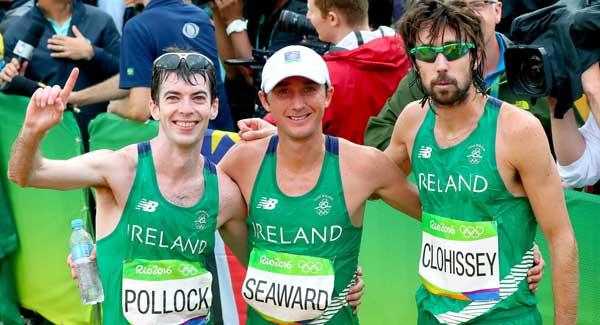Paul Pollock stormed up the field to take a creditable 32nd place for Ireland in the Olympic men’s marathon in Rio today.
He clocked 2:16:24 to finish seven-and-a-half minutes behind winner Eliud Kipchoge of Kenya, who claimed his first Olympic title after a previous silver and bronze.
And there you have it. Results for all 3 #TeamIreland athletes at the #Rio2016 games. Well done men. pic.twitter.com/guwVteugwz
— Team Ireland (@olympiccouncil) August 21, 2016
With heavy rain greeting the athletes for the 9:30am start local time at the Sambodromo, the street-wide stadium that serves as the focal point each February for the Rio Carnival, some real Irish weather looked as if it might play into the hands of the Team Ireland trio in the race – Pollock, Kevin Seaward and Mick Clohisey.
All three started deliberately conservatively, down past the 100th-place mark, as they sought to pick off the field above them one by one.
If you haven't seen #TeamIreland on TV, here's how the lads are looking out on the marathon course. pic.twitter.com/hF70khuMen
— Team Ireland (@olympiccouncil) August 21, 2016
This worked best for Pollock, the Annadale Striders athlete who finished as top Irishman at the European Athletics Championships Half-Marathon in Amsterdam last month.
He was 124th at 5km – behind Clohisey – remaining at the same mark at 10km, but had moved up to 96th by halfway.
From there, Pollock rapidly shot up the standings, going 74th by 30km and made a major move up to 50th a further five kilometres on.
Similarly dramatic progress was made over the final 7k, with Pollock crossing the line in 32nd place.
What a finish. 96th at halfway, @ppmarathon finishes 32nd in #Rio2016 marathon. #TeamIreland pic.twitter.com/cB0Ac4ZfiV
— Team Ireland (@olympiccouncil) August 21, 2016
Eliud Kipchoge claimed his first Olympic title in 2:08:44, a minute and 10 seconds clear of Ethiopian’s second-placed Feyisa Lilesa, the 2009 Dublin Marathon champion recording a time of 2:09:54.
Lilesa made a gesture in crossing the line that he later said was a protest against the arrest of Ethiopian anti-government protesters, who have come out against killing of the Oromo people, adding his life may now be in danger for the very-public sign of dissent.
Third was Galen Rupp of the United States, a further eleven seconds behind Lilesa.
Pollock’s 32nd position was joined by Kevin Seaward coming home in 64th in 2:20:06, and Mick Clohisey in 103rd on 2:26:34.

Belfast doctor Pollock felt he could have been a minute faster at halfway, with two minutes being taken off his time by the end, which would have left him in the top twenty.
“It was alright,” Pollock said, continuing: “It was a very conservative first half. I would have been quite disappointed if I hadn’t been tabled to push forward for the final ten miles, but I think I just left myself too much to do.
“I was about a minute down on where I wanted to be at halfway, but I knew I couldn’t push any harder than that first half. The legs were working hard enough as it was.
“I’m coming away from this a bit disappointed, but I think it was a solid enough performance
“The marathon is one of those events where anything can happen on the day.
“I was hoping for a top twenty position, I didn’t get that, but I’m coming away from this hopefully healthy, hopefully fit and hopefully able to target a faster marathon now and use this as a stepping stone for future things.
“Definitely I had my own game plan and I stuck with that.
“There was a certain group I was looking to stay with, and I stuck with them for the first half.
“It just so happened that they all went out slow as well. I came through nicely in the second-half but just left myself something to do.”

Seaward has been battling illness in the run-up to the Olympic marathon, but added he did not want to pull out of the event, as it’s the biggest and most prestigious fixture in athletics.
He said: “I lost a few days having picked up some kind of bug. I’ve been a bit ill, not feeling great.
“It’s almost flu-like symptoms. Bunged up, with sore throats. Sore everywhere, not really sure yet what it is.
“It was tough. After 3 or 4k, I was in a bad place already. That was a long way to go.
“The fact that you’re running for Ireland at the Olympic Games helps. If it was a city marathon or something else, I can’t say I would have been at the finish line.
“But because it’s an Olympic Games, you’re here in Rio. It’s not every day that comes around.
“If you’ve got an Irish shirt on, you’ve got to do everything you can to get towards the finish line.
“Mentally and physically, it’s been hard.”
Ireland had 14 top-10 finishes at these Olympics then, a very encouraging display despite the overall medal haul of two being down from the previous two Games in Beijing and London.


